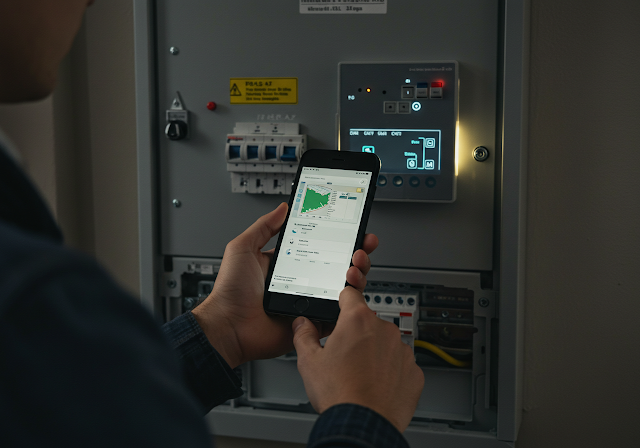Because flashy gadgets mean nothing if the power behind them is stuck in the past.
 |
So, you’ve got the smart lights. The voice assistant. The doorbell that doubles as a bouncer. Maybe even a thermostat that knows your schedule better than your own family does. Impressive, right?
Sure… until you realize all those high-tech toys are basically running on yesterday’s wiring with no real brain behind the brawn. Let’s have an honest moment: a smart home without a smart electrical system is just a regular home with Wi-Fi-enabled trinkets taped to it. It’s like buying a Ferrari but never changing the oil. If you want a truly intelligent home—not just a collection of shiny things that occasionally impress guests—you need to go deeper. And that starts with the electrical system running quietly (or not so quietly) behind your walls.
⚡ The Backbone of Smart Living: Your Electrical System
A smart electrical system is the silent MVP of any modern home. Think of it as the nervous system that connects and coordinates every part of your home’s tech. Without it, you’ve got a disconnected bunch of devices all trying to do their own thing—and usually failing at it in frustratingly unpredictable ways. A smart breaker panel or energy monitor acts like the brain, constantly analyzing, adjusting, and optimizing how power flows through your home.
Here’s the truth: today’s smart homes need more than Wi-Fi. They need infrastructure that can handle all the data, adapt to new devices, and make proactive decisions. Want your car charger to avoid peak energy rates? Need your fridge to alert you when it’s working overtime? That’s not your smart speaker’s job—it’s your electrical system’s. And if it’s not smart, none of that next-level automation is happening.
💸 Real Benefits That Hit Home
We all love the idea of saving money while being eco-friendly, right? Well, smart electrical systems aren’t just about convenience—they're financial lifesavers, too. A smart system tracks your home’s energy use in real time and helps you adjust accordingly. For instance, it might alert you that your dryer is hogging energy at peak hours or that your HVAC is kicking on more than it should. These insights turn into real savings.
Let’s look at some numbers:
- Smart thermostats can reduce heating/cooling costs by 10–15%.
- Smart lighting systems can lower your energy usage by up to 20%.
- Smart panels can alert you to “vampire” appliances sucking power 24/7, so you can stop the slow leak of dollars down the drain.
When you connect all this data and automation to a smart electrical system, you're no longer guessing how to save energy—you're doing it in real-time, with confidence.
🔧 Smarter Maintenance and Easier Fixes
Here’s something no one tells you when you start adding smart devices to your home: when things go wrong, you often have no idea why. Your lights flicker, your Wi-Fi drops, or your circuit trips—and suddenly you’re playing tech detective. That’s where a smart electrical system comes to the rescue.
With energy monitoring and automated diagnostics, your smart system can pinpoint problems before they become expensive disasters. Imagine getting a notification that your refrigerator has been pulling more power than usual—it might mean it’s failing, or maybe the coils just need cleaning. Either way, you know before you end up with a puddle of spoiled groceries. That’s next-level peace of mind.
🛡️ Security That Actually Thinks
You’ve got cameras, locks, sensors—all the bells and whistles. But what’s powering them, and more importantly, what’s coordinating them? A smart electrical system connects the dots. It's not just about plugging everything into the same Wi-Fi—it's about intelligent response, unified systems, and reliable power during emergencies.
For example, when your security camera detects motion at night, your smart system can instantly turn on the floodlights, alert your phone, and trigger a loudspeaker—all without you lifting a finger. And if someone tries to tamper with the power to disable your security? A smart breaker can alert you and even reroute power where needed. That’s defense with brains.
🏡 Boosting Property Value the Smart Way
Let’s face it: homebuyers today aren’t just looking for granite countertops anymore. They want homes that are connected, efficient, and ready for the future. A smart electrical system is one of those upgrades that makes realtors smile and appraisers nod.
Not only do these systems reduce monthly energy costs (a big selling point), but they also show that the home has been future-proofed. Buyers don’t want to inherit old wiring or janky fuse boxes—they want a place that’s move-in ready and tech-friendly. So while smart gadgets add curb appeal, it’s the smart electrical backbone that seals the deal.
🌱 Sustainability Starts Behind the Walls
We love our planet (and so does your power bill). The cool part? Smart electrical systems are a huge player in the sustainability game. By tracking and optimizing energy use, these systems can cut overall consumption by 20–30%, depending on how much tech you’ve got connected. And that’s before you start integrating solar panels or battery backups.
Smart systems can also manage energy sources more effectively. Have solar panels? Your system can decide when to use solar, when to draw from the grid, or when to store energy. That’s not just sustainable—it’s savvy. You're reducing emissions, lowering bills, and maximizing every watt your home generates.
📜 The Policies and Perks You Shouldn’t Sleep On
Now, let’s talk incentives. Governments and utility companies want you to go smart, and they’re ready to give you cash or credits to do it. In the U.S., the Energy Independence and Security Act laid the groundwork for integrating smart grid tech with home systems—think rebates for smart meters, tax credits for solar panels, and discounts on smart panel installs.
Across the pond, the European Union has been rolling out smart meter mandates that aim to cover 80% of households. The idea is simple: if homes use energy more efficiently, we all win. In some areas, there are even time-based pricing models that smart systems can take advantage of—like charging your EV when electricity is cheapest, without you lifting a finger.
🔌 The Takeaway: You Can't Have a Smart Home Without Smart Power
Listen, all those smart devices are fun. They’re flashy. They’re helpful. But without a smart electrical system underneath it all, they’re basically just expensive toys running on an outdated setup.
A smart electrical system isn’t a luxury anymore—it’s a necessity if you want your home to actually be as smart as it looks. So whether you’re building, renovating, or just tired of your energy bill looking like a car payment, it’s time to start thinking about the system behind the scenes.
Upgrade the brain, not just the bling.







